(完整版)《英语泛读教程2》教案
- 格式:pdf
- 大小:171.00 KB
- 文档页数:10
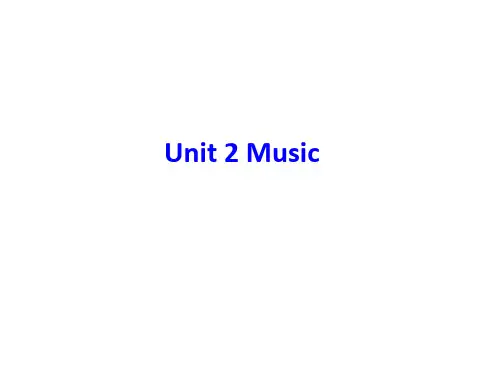
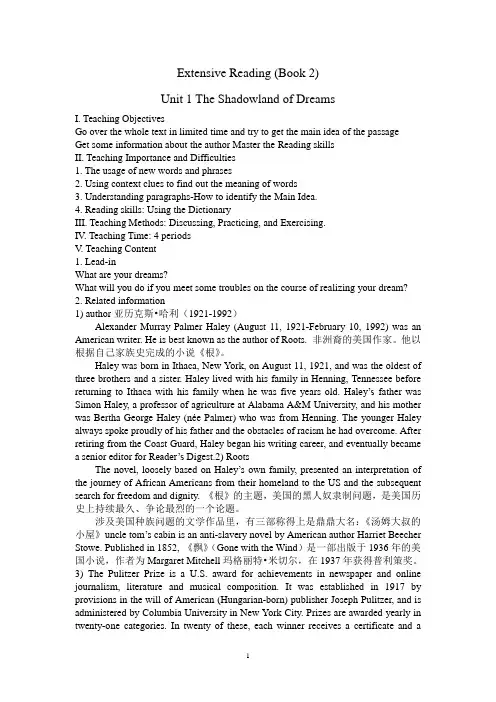
Extensive Reading (Book 2)Unit 1 The Shadowland of DreamsI. Teaching ObjectivesGo over the whole text in limited time and try to get the main idea of the passageGet some information about the author Master the Reading skillsII. Teaching Importance and Difficulties1. The usage of new words and phrases2. Using context clues to find out the meaning of words3. Understanding paragraphs-How to identify the Main Idea.4. Reading skills: Using the DictionaryIII. Teaching Methods: Discussing, Practicing, and Exercising.IV. Teaching Time: 4 periodsV. Teaching Content1. Lead-inWhat are your dreams?What will you do if you meet some troubles on the course of realizing your dream? 2. Related information1) author亚历克斯•哈利(1921-1992)Alexander Murray Palmer Haley (August 11, 1921-February 10, 1992) was an American writer. He is best known as the author of Roots. 非洲裔的美国作家。
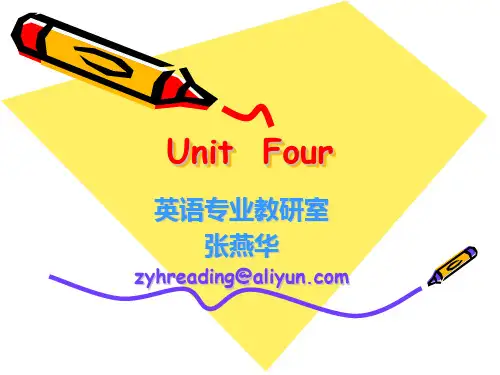
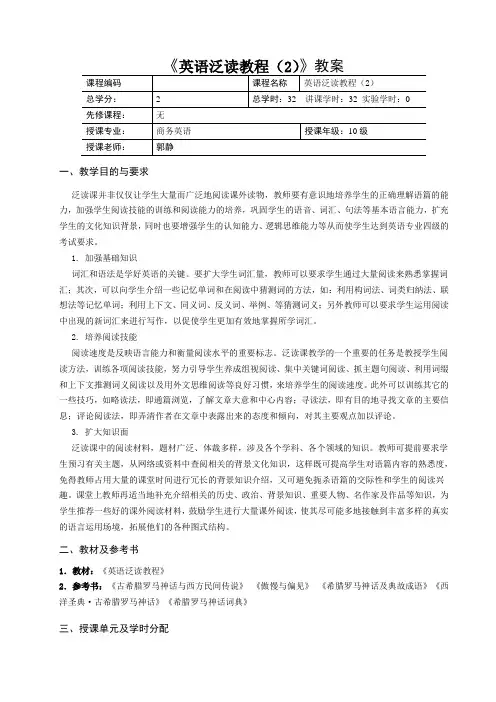
一、教学目的与要求泛读课并非仅仅让学生大量而广泛地阅读课外读物,教师要有意识地培养学生的正确理解语篇的能力,加强学生阅读技能的训练和阅读能力的培养,巩固学生的语音、词汇、句法等基本语言能力,扩充学生的文化知识背景,同时也要增强学生的认知能力、逻辑思维能力等从而使学生达到英语专业四级的考试要求。
1. 加强基础知识词汇和语法是学好英语的关键。
要扩大学生词汇量,教师可以要求学生通过大量阅读来熟悉掌握词汇;其次,可以向学生介绍一些记忆单词和在阅读中猜测词的方法,如:利用构词法、词类归纳法、联想法等记忆单词;利用上下文、同义词、反义词、举例、等猜测词义;另外教师可以要求学生运用阅读中出现的新词汇来进行写作,以促使学生更加有效地掌握所学词汇。
2. 培养阅读技能阅读速度是反映语言能力和衡量阅读水平的重要标志。
泛读课教学的一个重要的任务是教授学生阅读方法,训练各项阅读技能,努力引导学生养成组视阅读、集中关键词阅读、抓主题句阅读、利用词缀和上下文推测词义阅读以及用外文思维阅读等良好习惯,来培养学生的阅读速度。
此外可以训练其它的一些技巧,如略读法,即通篇浏览,了解文章大意和中心内容;寻读法,即有目的地寻找文章的主要信息;评论阅读法,即弄清作者在文章中表露出来的态度和倾向,对其主要观点加以评论。
3. 扩大知识面泛读课中的阅读材料,题材广泛、体裁多样,涉及各个学科、各个领域的知识。
教师可提前要求学生预习有关主题,从网络或资料中查阅相关的背景文化知识,这样既可提高学生对语篇内容的熟悉度,免得教师占用大量的课堂时间进行冗长的背景知识介绍,又可避免扼杀语篇的交际性和学生的阅读兴趣。
课堂上教师再适当地补充介绍相关的历史、政治、背景知识、重要人物、名作家及作品等知识,为学生推荐一些好的课外阅读材料,鼓励学生进行大量课外阅读,使其尽可能多地接触到丰富多样的真实的语言运用场境,拓展他们的各种图式结构。
二、教材及参考书1.教材:《英语泛读教程》2.参考书:《古希腊罗马神话与西方民间传说》《傲慢与偏见》《希腊罗马神话及典故成语》《西洋圣典·古希腊罗马神话》《希腊罗马神话词典》三、授课单元及学时分配本课程共8个教学单元,按每教学单元4课时分配。

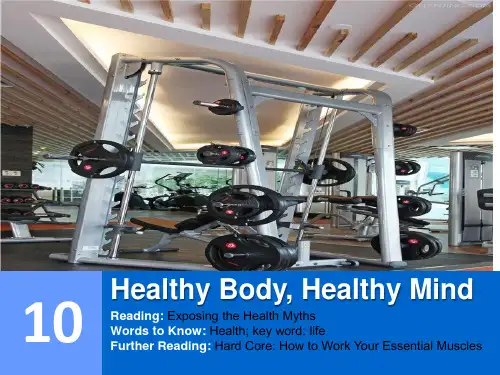
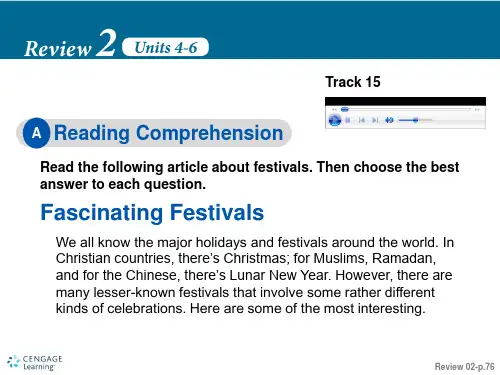
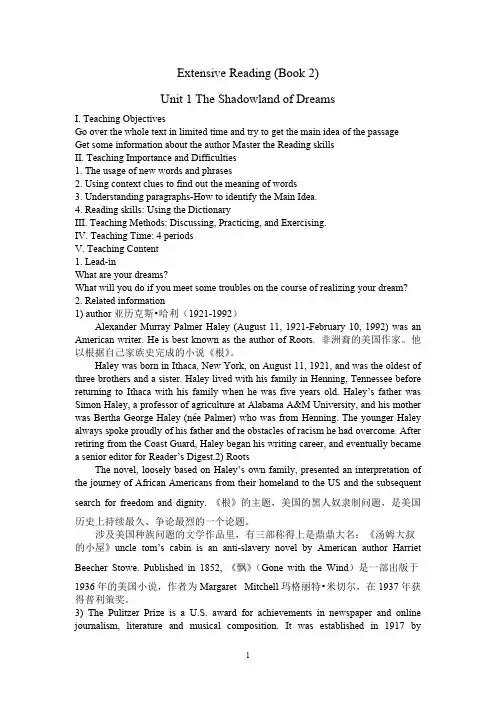
Extensive Reading (Book 2)Unit 1 The Shadowland of DreamsI. Teaching ObjectivesGo over the whole text in limited time and try to get the main idea of the passage Get some information about the author Master the Reading skillsII. Teaching Importance and Difficulties1. The usage of new words and phrases2. Using context clues to find out the meaning of words3. Understanding paragraphs-How to identify the Main Idea.4. Reading skills: Using the DictionaryIII. Teaching Methods: Discussing, Practicing, and Exercising.IV. Teaching Time: 4 periodsV. Teaching Content1. Lead-inWhat are your dreams?What will you do if you meet some troubles on the course of realizing your dream? 2. Related information1) author亚历克斯•哈利(1921-1992)Alexander Murray Palmer Haley (August 11, 1921-February 10, 1992) was an American writer. He is best known as the author of Roots. 非洲裔的美国作家。
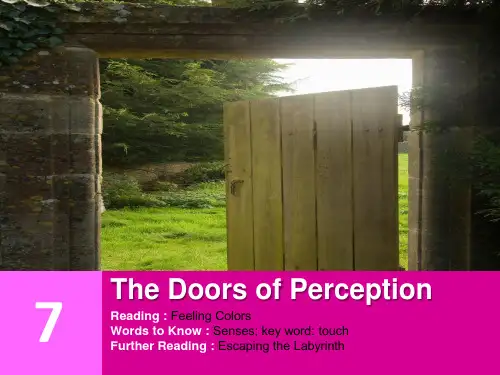
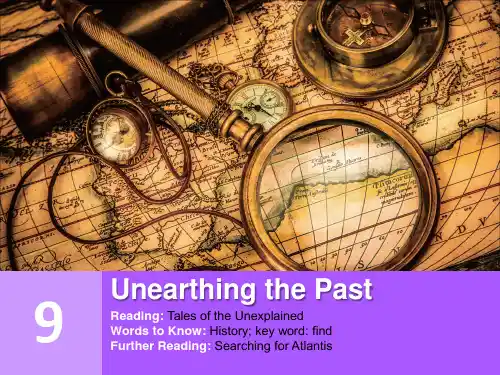
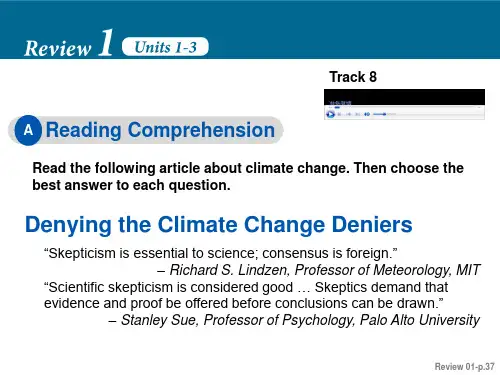
新教材高中英语新人教版必修第二册:UNIT 2 WILDLIFE PROTECTION阅读P20中的材料,选出最佳选项1.What's the poster on the left mainly about?A.The protection of ugly animals.B.The protection of good animals.C.The protection of bad animals.D.The protection of cute animals.2.What's the poster on the right mainly about?A.Cutting down trees.B.Destroying animals' homes.C.The habitat of animals.D.The less paper,the better.3.What can we learn about dolphins in the poster on the left?A.They are ugly animals.B.They are bad animals.C.They are cute animals.D.They are dangerous animals.4.What is the writer's opinion about wildlife protection according to the poster on the left?A.The good animals are more important than the bad ones.B.The ugly animals are more important than the bad ones.C.The ugly animals can make our planet more beautiful.D.All kinds of animals should be equally protected.5.Why should we use less paper according to the poster on the right?A.To plant trees for animals.B.To protect the habitat of animals.C.To make animals homeless.D.To make friends with koalas.[答案]1-5 ADCDBWords and Phrases知识要点1(教材P18)It is reported that living spaces for wildlife are being reduced due to the cutting of trees.据报道,由于砍伐树木,野生动物的生存空间正在减少。
英语泛读教程第二版第4册课程设计一、概述本课程是英语泛读教程第二版第4册的课程设计,主要涵盖了英语阅读的基本技能、阅读策略、语言技巧以及常见的阅读题型。
本课程旨在帮助学生提高英语阅读能力,掌握英语阅读的核心技能,同时培养学生的语言运用能力。
二、教学目标本课程的教学目标主要包括以下几个方面:1.提高学生的英语语言技能和阅读理解能力。
2.培养学生的自主学习能力和动手能力。
3.提高学生的口头和书面表达能力。
三、教学目录本课程的教学内容包括以下几个模块:模块一:英语阅读的基本技能1.英语阅读的基本技能介绍2.英语阅读中的字词理解和语法理解3.英语阅读中的拼读和发音理解模块二:阅读策略1.什么是阅读策略2.阅读策略的分类3.阅读策略的应用模块三:语言技巧1.英语阅读中的语言技巧介绍2.英语阅读中常用的语言技巧3.语言技巧的应用和实践模块四:阅读题型1.英语阅读中常见的题型2.理解题的解题技巧3.判断题的解题技巧4.填空题的解题技巧四、教学方法本课程将采用以下教学方法:1.学生自主阅读和研究相关文章,掌握阅读技巧和策略。
2.老师讲解相关理论和实例并进行讨论。
3.小组讨论和交流,提高学生的口头表达能力和沟通能力。
4.编写阅读材料及相关习题以提高学生学习的深度和广度。
5.作业和测试,及时检测学生的学习情况,做好针对性的辅导和帮助。
五、教学评估本课程的教学评估主要包括以下几个方面:1.平时学习表现,包括课堂表现、作业表现等。
2.期末考试和作业,测试学生的英语阅读能力。
3.小组讨论和个人口头表达评估,测试学生的口头表达能力和沟通能力。
六、小结本课程旨在帮助学生提高英语阅读能力,掌握英语阅读的核心技能和策略,同时培养学生的语言运用能力。
在教学过程中,我们将采用多种方法和手段来激发学生的学习兴趣,提高学生的自主学习和动手实践能力,为学生的未来学习和发展打造坚实的基础。
Extensive Reading (Book 2)Unit 1 The Shadowland of DreamsI. Teaching ObjectivesGo over the whole text in limited time and try to get the main idea of the passage Get some information about the author Master the Reading skillsII. Teaching Importance and Difficulties1. The usage of new words and phrases2. Using context clues to find out the meaning of words3. Understanding paragraphs-How to identify the Main Idea.4. Reading skills: Using the DictionaryIII. Teaching Methods: Discussing, Practicing, and Exercising.IV. Teaching Time: 4 periodsV. Teaching Content1. Lead-inWhat are your dreams?What will you do if you meet some troubles on the course of realizing your dream? 2. Related information1) author亚历克斯•哈利(1921-1992)Alexander Murray Palmer Haley (August 11, 1921-February 10, 1992) was an American writer. He is best known as the author of Roots. 非洲裔的美国作家。
他以根据自己家族史完成的小说《根》。
Haley was born in Ithaca, New York, on August 11, 1921, and was the oldest of three brothers and a sister. Haley lived with his family in Henning, Tennessee before returning to Ithaca with his family when he was five years old. Haley’s father was Simon Haley, a professor of agriculture at Alabama A&M University, and his mother was Bertha George Haley (née Palmer) who was from Henning. The younger Haley always spoke proudly of his father and the obstacles of racism he had overcome. After retiring from the Coast Guard, Haley began his writing career, and eventually became a senior editor for Reader’s Digest.2) RootsThe novel, loosely based on Haley’s own family, presented an interpretation of the journey of African Americans from their homeland to the US and the subsequent search for freedom and dignity. 《根》的主题,美国的黑人奴隶制问题,是美国历史上持续最久、争论最烈的一个论题。
涉及美国种族问题的文学作品里,有三部称得上是鼎鼎大名:《汤姆大叔的小屋》uncle tom’s cabin is an anti-slavery novel by American author HarrietBeecher Stowe. Published in 1852, 《飘》(Gone with the Wind)是一部出版于1936年的美国小说,作者为Margaret Mitchell玛格丽特•米切尔,在1937年获得普利策奖。
3) The Pulitzer Prize is a U.S. award for achievements in newspaper and online journalism, literature and musical composition. It was established in 1917 byprovisions in the will of American (Hungarian-born) publisher Joseph Pulitzer, and is administered by Columbia University in New York City. Prizes are awarded yearly in twenty-one categories. In twenty of these, each winner receives a certificate and a US$10,000 cash award. The winner in the public service category of the journalism competition is awarded a gold medal.3. Contents AnalysisMain idea: In the text, by explaining the difference between wanting to become a writer & wanting to write, the author first suggests to those who want to become professional writers that being a writer does not just mean wealth and fame, but also the long periods of neglect & poverty. Then he tells about his struggle to stick to his dream of winning his final success. Finally he draws the conclusion that one must learn to struggle in the shadowland of dreams in order to become successful & one should never forget the courage & persistence it takes to stay the course in the shadowland even after success.Part I (para.1): the difference between―being a writer and writing.Part II (para. 2–3rd para.): author’s own hard life experience before becoming a famous writerPart III (last 4 paras): lesson drawn from his own writing career: courage & persistence are needed for becoming a successful writer.4. Words and PhrasesCherish: keep fondly in mind 充满感情地怀有Fond: cherished 珍爱的Longing: earnest desireRequite: reward, give … in returnProspect: chances of future success 前途Superintendent: manager(大楼的)管理人down-home: of, relating to, or reminiscent (怀旧的)of a simple, wholesome, unpretentious lifestyle, esp. that associated with the rural southern United States乡土的,田园生活的,尤指美国南方乡村的生活方式stay the course: to endure or persist 持续到底VI. Assignment:1. To remember key words and expressions in Text A.2. Home readingUnit 2 Critical ThinkingI. Teaching Objectives(教学目标)1. Go over the whole text in limited time and try to get the main idea of the passage2. Get some information about Critical Thinking in daily life and education.3. Master the Reading skillsII. Teaching Importance and Difficulties1. The usage of new words and phrases2. Using context clues to find out the meaning of words3. Understanding paragraphs-How to identify the Main Idea.4. Reading skills: Dealing with Synonyms and AntonymsIII. Teaching Method: Teaching, Discussing, PracticingIV. Teaching Time: 4 periodsV. Teaching Content1. Lead- in Questions:Have you heard of critical thinking?What are some of the obstacles to the development of critical thinking?2. Vocabulary in contextHercules: In Greek myth, Hercules proved his courage and strength by completing 12 very difficult tasks.Undermine: (vt.) make sth weaker; weakens 破坏;侵蚀基础;暗中破坏;冲蚀,削弱Synonyms: Weaken, worsen, demoralize, destroySomewhere around: approximately3. Text ComprehensionIn college education and in daily life, critical thinking is of vital importance. Richard Paul, in the following section, gives an enlightening discussion of the issue.Part 1 (para1-2) definitions of CTPart 2. (para 3) current situation-many people ignore CTPart 3 (para 4-6) we need thinking more comprehensively (eg. control culture)Part 4(para 7) our task-a critical societyPart 5 (para 8-10) barriers to CTPart 6 (para 11-12) what we should do-be historical thinkers.Part 7(para13-15) standards to assess CT (eg. Doctor’s malpractice)Part 8(para 16-17)conclusion: we need CT.VI. Assignment:1. To remember key words and expressions in Text A.2. Home readingUnit 3 RecyclingI. Teaching ObjectivesGo over the whole text in limited time and try to get the main idea of the passage Getting to know some information about recycling in USA and our country.II. Teaching Importance and Difficulties1. The usage of new words and phrases2. Using context clues to find out the meaning of wordsIII. Teaching Methods: Teaching, Discussing and PracticingIV. Teaching Time: 4 periodsV. Teaching Content1. Related InformationRecycling involves processing used materials into new products to prevent waste of potentially useful materials, reduce the consumption of fresh raw materials, reduce energy usage, reduce air pollution (from incineration) and water pollution.2. Lead-in question:What is the significance of recycling?3. Vocabulary in contextFact sheet: a piece of paper giving information about a subject 资料页Compost: make … into compost 把…制成堆肥Fad: something that people are interested in for only a short period of time Scrapped: junkyard 废品场Rock-bottom: the lowest pointVI. Assignment:1. To remember key words and expressions in Text A.2. Home readingUnit 4 The Lady on Pemberton StreetI. Teaching ObjectivesGo over the whole text in limited time and try to get the main idea of the passage II. Teaching Importance and Difficulties1. The usage of new words and phrases2. Using context clues to find out the meaning of words3. Understanding paragraphs-How to identify the Main Idea.III. Teaching Methods: Teaching, Discussing and PracticingIV. Teaching Time: 4 periodsV. Teaching Content1. Lead-in question:Do you know what a block captain is? (a person who asks for city services, reports trouble to police and coordinates efforts to keep the block clean and safe)What is your impression of them?2. Vocabulary in contextRow house: terraced house (one of a row of houses that are joined together on each side) 一栋排房Vial: phial 小玻璃瓶Flier: flyer 传单Be in sb’s debt: feel grateful to sb for their help 欠某人的情,感激某人Sheaf: a number of pieces of paper tied or held together 一叠,一沓Self-conscious: embarrassed and nervous 不自然的VI. Assignment:1. To remember key words and expressions in Text A.2. Home readingUnit 5 A Mother’s PlaceI. Teaching ObjectivesGo over the whole text in limited time and try to get the main idea of the passage II. Teaching Importance and Difficulties1. The usage of new words and phrases2. Using context clues to find out the meaning of wordsIII. Teaching Methods: Teaching, Discussing and PracticingIV. Teaching Time: 4 periodsV. Teaching Content1. Lead-in questions:Do children still need their parents after getting married?Should they live together in the same house?2. Vocabulary in contextDownpour: heavy rainBlow up: (AmE) an occasion when somebody suddenly becomes angryStump: walk in a heavy and angry wayTo that effect: 有那个意思Square one’s shoulders: make the back and shoulders straight to show he/she is ready 挺直身子,挺起胸膛Trailer: (AmE) a vehicle without an engine, that can be pulled by a car or truck or used as a home (拖车式)活动房屋VI. Assignment:1. To remember key words and expressions in Text A.2. Home readingUnit 6 Fathers & Sons: the Bonding ProcessI. Teaching ObjectivesGo over the whole text in limited time and try to get the main idea of the passage II. Teaching Importance and Difficulties1. The usage of new words and phrases2. Using context clues to find out the meaning of wordsIII. Teaching Methods: Teaching, Discussing and PracticingIV. Teaching Time: 4 periodsV. Teaching Content1. Lead-in questions:What do you think makes a good father?What should be the relationship between fathers and daughters?2. Vocabulary in contextRolled into one: combined in one person or thing 集于一身Instill: (~ sth in sb) gradually make sb feel or think 逐步培养,灌输in abundance: in large quantitiesdeadbeat: (infml) a lazy person; a person with no job and no money 身无分文的无业者VI. Assignment:1. To remember key words and expressions in Text A.2. Home readingUnit 7 Numbers and OmensI. Teaching ObjectivesGo over the whole text in limited time and try to get the main idea of the passage II. Teaching Importance and Difficulties1. The usage of new words and phrases2. Using context clues to find out the meaning of wordsIII. Teaching Methods: Teaching, Discussing and PracticingIV. Teaching Time: 4 periodsV. Teaching Content1. Lead-in questions:What is the significance of numbers in your life?Do you think that faith in numbers is superstitious? Why or why not?2. Vocabulary in contextOmen: a sign of what is going to happen in the futureChew out: scold; speak angrily to 严厉责备Halo: corona (a ring of light seen around the sun or moon) 日华,月华Betrothal: having promised to marry sb; engagement 订婚Unbiased: impartial; fair and not influenced by sb’s opinions 不偏不倚的VI. Assignment:1. To remember key words and expressions in Text A.2. Home readingUnit 8 Getting Enough Sleep? Dream onI. Teaching ObjectivesGo over the whole text in limited time and try to get the main idea of the passage II. Teaching Importance and Difficulties1. The usage of new words and phrases2. Using context clues to find out the meaning of words3. Understanding paragraphs-How to identify the Main Idea.III. Teaching Methods: Teaching, Discussing and PracticingIV. Teaching Time: 4 periodsV. Teaching Content1. Lead-in questions:Do you get enough sleep every day?Have you suffered any sleeping problems?2. Vocabulary in contextGo to great lengths: put a lot of effort 不遗余力Odd hours: not very regular hoursDeceive: make somebody believe something that is not trueVivacious: lively 活泼的Optimally: perfectly; ideally; bestAmass: accumulateVI. Assignment:1. To remember key words and expressions in Text A.2. Home readingUnit 9 Invented WordsI. Teaching ObjectivesGo over the whole text in limited time and try to get the main idea of the passage II. Teaching Importance and Difficulties1. The usage of new words and phrases2. Using context clues to find out the meaning of words3. Understanding paragraphs-How to identify the Main Idea.III. Teaching Methods: Teaching, Discussing and PracticingIV. Teaching Time: 4 periodsV. Teaching Content1. Lead-in question:Do you know how new words are born in English?2. Vocabulary in contextMilkshake: a drink made of milk, ice cream with an added flavour of fruit or chocolate 奶昔Keep track of: have information about 了解…动态VI. Assignment:1. To remember key words and expressions in Text A.2. Home readingUnit 10 Nuclear EnergyI. Teaching ObjectivesGo over the whole text in limited time and try to get the main idea of the passage II. Teaching Importance and Difficulties1. The usage of new words and phrases2. Using context clues to find out the meaning of words3. Understanding facts and opinionsIII. Teaching Methods: Teaching, Discussing and PracticingIV. Teaching Time: 4 periodsV. Teaching Content1. Lead-in question:Do you know the way nuclear energy is produced?2. Vocabulary in contextEquilibrium: a state of balance, especially between two opposing forces 均势Spin: (v.) make … turn round quicklyEntail: involve something that can’t be avoided 牵涉Dog: (v.) follow somebody closely 尾随Meltdown: a serious accident in which the central part of a nuclear reactor melts, causing harmful radiation to escape 核反应堆核心熔毁Cleanup: (n.) the process of removing pollutionRepository: a place where a large number of things can be kept 存放处Narrowly: only by a small amount 勉强地;以微弱优势地VI. Assignment:1. To remember key words and expressions in Text A.2. Home readingUnit 11 The Rocking-Horse Winner (I)Go over the whole text in limited time and try to get the main idea of the passage Get some information about the D. H. Lawrence and his major works.Master the Reading skills: making inferencesII. Teaching Importance and Difficulties1. The usage of new words and phrases2. Understanding paragraphs-How to analyze the theme of the text.3. Reading skills: making inferencesIII. Teaching Methods: Teaching, Discussing, PracticingIV. Teaching Time: 6 periodsV. Teaching Content(教学内容)1. Related informationAuthor: D. H. Lawrence (1885-1930) an English novelist, poet, playwright, literary critic and painter. D. H. Lawrence was born in Easter wood, Nottinghamshire (诺丁汉郡). His father was a barely literate miner, and his mother was a middle-class woman and a school teacher, and had a deep influence upon his life.After receiving education at local schools and at Nottingham University College, Lawrence worked for a time as a teacher. In the meantime, he began to write and publish literary works.2. Vocabulary in the textIn style: in an impressive way 气派地,隆重地Nursery: a room in a house where young children can play 儿童室3. Character AnalysisYoung Paul—innocent, sensitive, responsible and unselfish.the mother—a cold, unfeeling, greedy, materialistic woman disguised in the cover of a loving mother and wife;Uncle Oscar—an unscrupulous (不讲道德)man who takes advantage of his nephew’s supernatural talents to his own advantage, without considering for a moment the pressures such activity may place upon the young boy.English gardener—he is passive, loyal, a little bit afraid of his superiors, and somewhat greedy to the extent.VI. Assignment:1. To remember key words and expressions in Text A.2. Home readingUnit 12 Social critic with VerveI. Teaching ObjectivesGo over the whole text in limited time and try to get the main idea of the passageII. Teaching Importance and Difficulties1. The usage of new words and phrases2. Using context clues to find out the meaning of words3. Understanding paragraphs-How to identify the Main Idea.III. Teaching Methods: Teaching, Discussing and PracticingIV. Teaching Time: 6 periods1. Lead-in questions:Have you heard of Ms. Sontag?What were the major achievements made by Ms. Sontag?2. Vocabulary in contextVI. Assignment:1. To remember key words and expressions in Text A.2. Home readingUnit 13 Giving Hitler Hell (I)I. Teaching ObjectivesGo over the whole text in limited time and try to get the main idea of the passage II. Teaching Importance and Difficulties1. The usage of new words and phrases2. Using context clues to find out the meaning of words3. Understanding paragraphs-How to identify the Main Idea.III. Teaching Methods: Teaching, Discussing and PracticingIV. Teaching Time: 6 periodsV. Teaching Content1. Lead-in question:What do you know about Hitler?2. Vocabulary in contextVI. Assignment:1. To remember key words and expressions in Text A.2. Home readingUnit 14 Overdue InterestI. Teaching ObjectivesGo over the whole text in limited time and try to get the main idea of the passage II. Teaching Importance and Difficulties1. The usage of new words and phrases2. Using context clues to find out the meaning of words3. Understanding paragraphs-How to identify the Main Idea.III. Teaching Methods: Teaching, Discussing and PracticingIV. Teaching Time: 6 periodsV. Teaching Content1. Lead-in question:Why should we Chinese always remember the Nanjing Massacre?2. Vocabulary in contextVI. Assignment:1. To remember key words and expressions in Text A.2. Home readingUnit 15 The Old Man and the Sea (I)I. Teaching ObjectivesGo over the whole text in limited time and try to get the main idea of the passage II. Teaching Importance and Difficulties1. The usage of new words and phrases2. Using context clues to find out the meaning of words3. Understanding paragraphs-How to identify the Main Idea.III. Teaching Methods: Teaching, Discussing and PracticingIV. Teaching Time: 6 periodsV. Teaching Content1. Lead-in questions:Have you read the Old Man and the Sea? Discuss the friendship between the old man and the boy.2. Vocabulary in contextVI. Assignment:1. To remember key words and expressions in Text A.2. Home reading课程教材:《英语泛读教程2》,第三版,高等教育出版社:2011年出版。